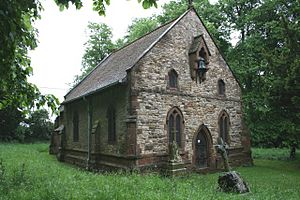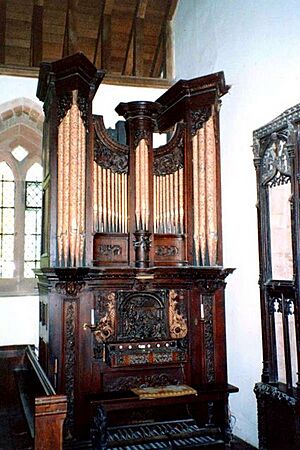St Michael and All Angels Church, Brownsover facts for kids
Quick facts for kids St Michael and All Angels Church, Brownsover |
|
|---|---|

St Michael and All Angels Church, Brownsover, from the southwest
|
|
| Lua error in Module:Location_map at line 420: attempt to index field 'wikibase' (a nil value). | |
| OS grid reference | SP 508 773 |
| Location | Brownsover, Rugby, Warwickshire |
| Country | England |
| Denomination | Anglican |
| Website | Churches Conservation Trust |
| History | |
| Dedication | St Michael and All Angels |
| Architecture | |
| Functional status | Redundant |
| Heritage designation | Grade II* |
| Designated | 1 October 1949 |
| Architect(s) | Sir George Gilbert Scott (restoration) |
| Architectural type | Church |
| Style | Gothic |
| Groundbreaking | 13th century |
| Specifications | |
| Materials | Stone, clay tile roof |
St Michael and All Angels Church is a very old church in Brownsover. Brownsover is now part of Rugby, in Warwickshire, England. This church is no longer used for regular services. It is a special building, protected as a Grade II* listed building. This means it is very important historically. The Churches Conservation Trust takes care of it.
Contents
History of the Church
Early Beginnings
This church started way back in the 1200s. It was a small church, or 'chapel of ease'. It helped people from Brownsover attend church without traveling far to the main church in Clifton-upon-Dunsmore. More windows were added to the church in the 1200s, 1300s, and 1400s. After the English Reformation, strong supports called buttresses were added. A porch was also built at the west end of the church.
Victorian Restoration
In 1876, the church was almost completely rebuilt. This was part of a big project by Sir George Gilbert Scott. He was a famous architect. He worked for Allesley Boughton-Leigh, who lived nearby at Brownsover Hall. Even though it was almost a new church, Scott made sure it still looked like the original. In the early 1900s, new stained glass was put into the east window.
Becoming a Protected Site
The church stopped being used for regular services on February 10, 1987. It then became the responsibility of the Churches Conservation Trust. This trust works to protect important old churches across England.
Church Architecture
Outside the Church
The church is built from cream-coloured stone. It has reddish-brown stone decorations. The roof is made of clay tiles. The church has a simple shape. It has a main hall called a nave and a smaller section called a chancel. The nave is about 30 feet (9.1 meters) long and 24 feet 9 inches (7.5 meters) wide. The chancel is about 19 feet 6 inches (5.9 meters) long and 13 feet 3 inches (4.0 meters) wide.
There is a small brick part at the northeast corner. This is between the nave and the chancel. The west end of the church has a pointed roof, called a gable. It also has diagonal buttresses for support. A stone band, called a string course, runs along the wall. You enter the church through a pointed arch doorway on the west side. On each side of this door are windows with two sections. Above these are smaller windows with one section. Between them, a bell hangs from a gabled bracket. The north and south sides of the nave have two-section windows. A buttress stands between them. There is a tall, narrow window, called a lancet window, in the east wall of the nave. The chancel has diagonal buttresses. It has a large east window with three sections. On its north side, there is a paired lancet window. On the south side, there is a similar window and a single lancet window.
Inside the Church
The inside of the church is mostly covered in plaster and painted white. The floor has colourful tiles from the 1800s. In the south wall, there is a small basin called a piscina. This was used for washing sacred vessels. The font, where baptisms take place, is round and dates from the 1200s.
The east window has stained glass from the 1900s. It remembers Lawrence Sheriff, who started Rugby School. All the other windows have clear glass. Inside the church, there is a rectangular wooden screen. It dates from the 1400s and was added to later. The wooden pulpit, where sermons are given, is from Flanders. It was made in the 1700s and is built into the east wall of the nave. The organ case is from Germany and is very fancy. It was made in 1660 for St John's College, Cambridge. It was moved here in the late 1800s. The organ itself was built in 1876 by the Bryceson Brothers.
See also
 | Toni Morrison |
 | Barack Obama |
 | Martin Luther King Jr. |
 | Ralph Bunche |


